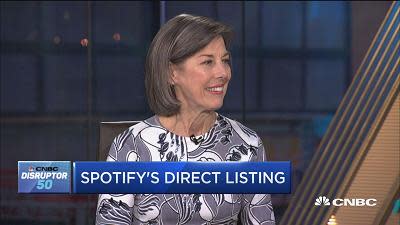How Spotify's direct listing is different from an IPO

Spotify's direct listing is different from IPOs because the company is both listing and offering shares at the same time without banks' help.
Spotify doesn't need to raise capital, so it did not need to go out to banks.
It also didn't need to do a roadshow because investors were familiar with the company and what it does.
When Spotify SPOT went public on Tuesday, it became one of the largest tech companies to do so in recent years.
The company opened at $165.90 a share , giving it a $29.5 billion valuation based on the 178,112,840 ordinary shares outstanding.
It's also noteworthy because the way it's going public on the New York Stock Exchange is highly unusual — a direct listing, meaning shares will be offered directly to public investors without any Wall Street banks underwriting it.
What is a direct listing?
In a traditional initial public offering, banks underwrite the offering, meaning they set an offering price, and buy or sell shares during the initial selling to keep prices from being too volatile.
But Spotify's direct listing — unusual enough on its own — is further different because the company is both direct listing and offering shares for the first time without the banks' underwriting assistance. (Some companies have direct listed on the exchange in the past, but those have essentially always been either spin-offs, companies coming out of bankruptcy, or companies moving from another exchange.)
Spotify is able to do this for two main reasons. First, it doesn't need to raise capital because the company is cash flow positive . Second, because both the company and what it does is well-understood worldwide, it's able to skip the traditional roadshow process where executives explain the company to potential investors.
Thus Spotify is in a unique scenario. NYSE President Tom Farley told CNBC it will "likely will not be common" to see other companies qualify for the direct listing process.
"I'm not quick to jump to 'hey if this is a success it's a revolutionary overhaul of the IPO process,'" Farley said on CNBC's "Squawk on the Street."
"Spotify is unique. They're not the only ones, but they are unique in the sense that they do have unlimited access to capital, they do have a worldwide brand and 70 million users. There aren't a whole lot of companies in the world that fit that profile for whom this type of transaction is right in the sweet spot," Farley said.
Spotify said it chose this process because it allows the company to list without selling shares, offers liquidity to shareholders, and would provide equal access to buyers and sellers. It also wanted the process to be transparent and allow the market to set the price of shares.
The NYSE set Spotify's reference price — which is not the same as an IPO price — at $132 ahead of Tuesday's trading. The reference price is not the opening price, or the offering price for the shares. Instead the opening price will be determined after the NYSE takes all buy and sell orders from brokers-dealers until an agreed upon single price is found.
— CNBC's Sara Salinas contributed to this report.
More From CNBC
